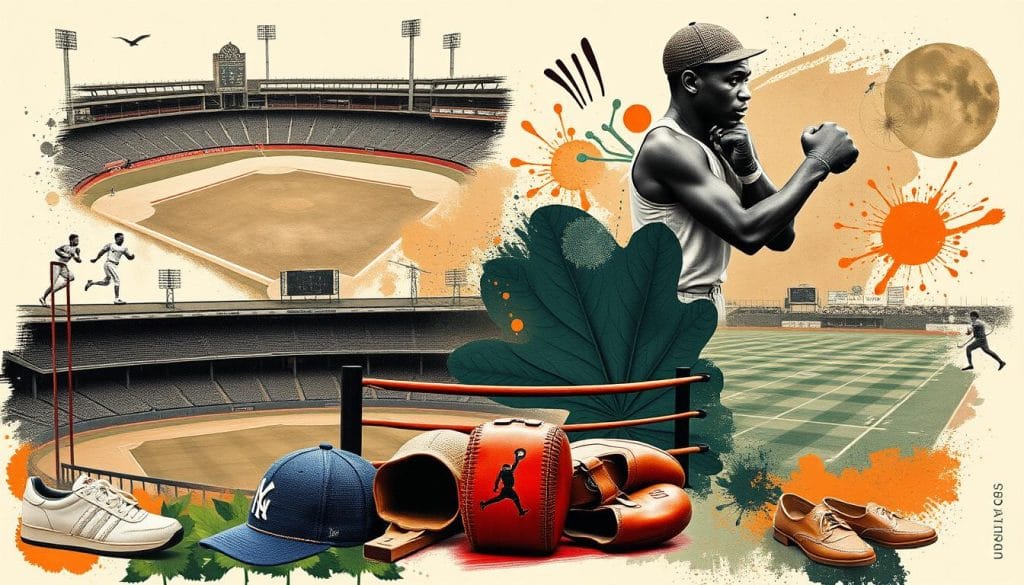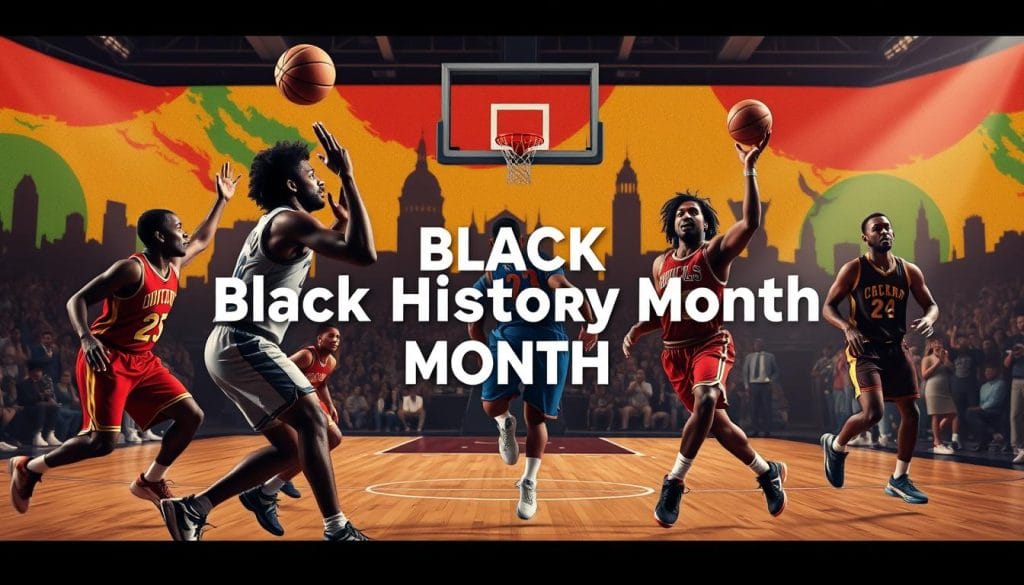About 70% of National Football League players are African American. This shows how much Black athletes have changed sports. As we celebrate Black History Month, we honor the achievements of African American athletes. They have made a big impact on American culture and the Civil Rights Movement.
From Jackie Robinson’s debut in baseball to today, Black athletes have made a difference. Their stories inspire us and push for diversity and inclusion. It’s important to celebrate their achievements during Black History Month.
Key Takeaways
- Black athletes have made significant contributions to the sports industry, breaking barriers and redefining the game.
- The Civil Rights Movement has played a crucial role in shaping the experiences of Black athletes.
- African American History is essential to understanding the context of Black athletes’ achievements.
- Black History Month is an opportunity to celebrate the achievements of Black athletes and promote diversity, equity, and inclusion.
- The legacy of Black athletes continues to inspire new generations of athletes and fans.
- Recognizing the contributions of Black athletes is essential to promoting a more inclusive and equitable sports industry.
Introduction to Black History in Sports
Black pioneers have made big impacts in sports. Their contributions are key to understanding sports history. By celebrating Black culture and achievements, we see the value of Diversity, Equity, and Inclusion (DEI).
The journey of Black athletes in sports is filled with challenges and triumphs. From facing segregation to achieving success today, their stories are inspiring. Understanding their history helps us value their role in sports.
Importance of Recognizing Contribution
It’s vital to recognize Black athletes’ contributions to promote DEI in sports. Celebrating their wins and acknowledging their struggles helps create a fair environment for all. Initiatives like supporting Black athletes and promoting diversity in leadership are important steps.
- Creating programs to support Black athletes and provide them with resources and opportunities
- Promoting diversity and inclusion in sports leadership and management
- Celebrating Black culture and heritage through sports events and initiatives
Understanding the Historical Context
The history of Black athletes in sports is complex. It’s important to grasp the social, cultural, and economic factors that shaped their experiences. By learning from the past, we can build a fairer future for all athletes.
Pioneers of Change: Early Black Athletes
During Black History Month, we celebrate those who paved the way for others. Jack Johnson became the first black heavyweight champion in 1908. His win was a big step towards breaking racial barriers in sports.
Jack Johnson: The First Black Heavyweight Champion
Johnson’s victory showed his hard work and talent. It was a turning point for equality in sports. His legacy still inspires athletes today, making his story key to Black History Month.
Jessie Owens: A Stand Against Racial Barriers
Jessie Owens made history at the 1936 Berlin Olympics. He won four gold medals, showing strength against racial barriers. His courage and determination continue to inspire people worldwide.

These pioneers have greatly influenced sports. Their stories motivate athletes today. Celebrating Black History Month, we honor their achievements and their fight for equality and justice.
| Name | Achievement | Year |
|---|---|---|
| Jack Johnson | First black heavyweight champion | 1908 |
| Jessie Owens | Four gold medals at the Berlin Olympics | 1936 |
The Impact of the Civil Rights Movement
The Civil Rights Movement changed sports forever. It allowed African American athletes to overcome racial barriers and shine. This movement, a key part of African American History, made athletes into activists. They used their fame to highlight social injustices and fight for equality.
Important events like the Montgomery Bus Boycott and the March on Washington shaped sports. They showed how crucial diversity, equity, and inclusion (DEI) are in sports. Athletes started to speak out for change.
Athletes as Activists: A New Role
Icons like Muhammad Ali and Jackie Robinson used their fame to fight racism and inequality. They inspired others to use their voices for social justice and DEI in sports.
Notable Events and Their Influence
The 1968 Olympics’ Black Power Salute was a turning point. It featured Tommie Smith and John Carlos, sparking a national debate on racism in sports.
- The Montgomery Bus Boycott (1955-1956)
- The March on Washington (1963)
- The Black Power Salute (1968)
These events and others have shaped sports. They pushed for more African American representation and inspired athletes to fight for justice.
Icons of the Game: Basketball Legends
During Black History Month Tribute, we celebrate African American achievements in basketball. The sport has been shaped by legendary players. They have made a lasting impact on the game.
Some notable basketball legends include:
- Bill Russell, known for his impressive championship wins and commitment to social justice.
- Michael Jordan, who globalized the game and became a cultural icon.
These athletes have not only excelled in their sport but have also used their platforms. They promote Black excellence and advocate for equality. Their contributions to the game show the power of African American achievements in sports.

Their legacy continues to inspire new generations of athletes and fans. It shows the importance of Black culture in basketball. As we celebrate Black History Month Tribute, we honor the icons of the game. They have paved the way for future generations.
| Basketball Legend | Notable Achievements |
|---|---|
| Bill Russell | 11 NBA championships, 5 MVP awards |
| Michael Jordan | 6 NBA championships, 5 MVP awards |
Pioneering Women in Sports
The world of sports has been shaped by many Black pioneers, including women. They have broken barriers and achieved greatness. These women have not only excelled in sports but have also inspired future generations.
Wilma Rudolph is one such pioneer. She became the first American woman to win three gold medals in track and field at the 1960 Rome Olympics. Her achievements went beyond sports, as she became a key figure in the Civil Rights Movement.
Wilma Rudolph: From Olympics to Activism
Rudolph’s legacy inspires women and girls worldwide, especially in the Black community. She is celebrated as a symbol of Black excellence and perseverance. Her story highlights the need for diversity, equity, and inclusion in sports and beyond.
Serena Williams: Dominance and Advocacy
Serena Williams is another iconic figure in sports, known for her tennis skills and advocacy. She has spoken out against racism and sexism, inspiring many. Her career shows that athletes can also be powerful voices for change.
These pioneering women have opened doors for future Black athletes. They show that greatness is possible and that celebrating Black culture is essential. Their stories remind us of the importance of diversity, equity, and inclusion in all areas of life.
Football’s Trailblazers
Notable black figures have made big impacts on football. During Black History Month, we celebrate their achievements. They paved the way for future athletes.
Players like Jim Brown and Colin Kaepernick stand out. They were great on the field and fought for social justice. Their work inspires many.
Jim Brown: Revolutionizing the Running Back Position
Jim Brown’s career was filled with records and awards. He’s one of the best running backs ever. His talent and hard work show the impact of black figures in football.
Colin Kaepernick: Taking a Stand for Justice
Colin Kaepernick’s act of kneeling during the anthem started a big conversation. It was about racial inequality and police brutality. His bravery shows the power of black voices in fighting for justice.
Black History Month is a time to honor football’s trailblazers. Their stories remind us of the importance of perseverance and advocacy. They inspire athletes and social justice advocates today.
| Name | Position | Achievements |
|---|---|---|
| Jim Brown | Running Back | 9-time Pro Bowl selection, 8-time First-team All-Pro |
| Colin Kaepernick | Quarterback | 2-time Pro Bowl selection, Super Bowl XLVII appearance |
Transformative Moments in Sports History
The Civil Rights Movement changed African American History in many ways. It touched the world of sports too. A key moment was when Major League Baseball welcomed its first black players.
This move was a big step towards equality. It showed the Civil Rights Movement’s goals were not just about politics and society. It also opened doors for black athletes and helped change how people thought about racial equality.
The Rise of Black Coaches and Executives
After baseball’s integration, black coaches and executives started to rise. This was a big step in African American History. It showed the sports world was becoming more diverse and inclusive.
Important figures in this change have worked hard to bring more diversity to sports. They have inspired many athletes and executives. Their work shows how sports can help bring about social change.
| Figure | Contribution | Impact on African American History |
|---|---|---|
| Jackie Robinson | Integrated Major League Baseball | Paved the way for future black athletes |
| Frank Robinson | Became the first black manager in MLB | Broader opportunities for black coaches and executives |
The Role of HBCUs in Athletic Development
Historically Black Colleges and Universities (HBCUs) have been key in helping African American athletes. They offer chances to show off skills and chase dreams. As we celebrate Black History Month, we must honor HBCUs’ role in sports achievements.
HBCUs have a long history of producing top athletes. They’ve helped many African American athletes succeed in sports like football and basketball. Many of these athletes say their HBCU experience helped them grow and prepare for the big leagues.
Promoting Talent in Historically Black Colleges
HBCUs have been crucial in showcasing African American talent in sports. Their athletes’ success has inspired others to follow their dreams. This shows how vital HBCUs are in developing athletic talent.
Success Stories: NFL and NBA Stars
Many famous NFL and NBA stars came from HBCUs. Jerry Rice went to Mississippi Valley State University, and Earl Monroe attended Winston-Salem State University. Their stories prove HBCUs’ big impact on sports and highlight African American achievements during Black History Month.
| HBCU | Athlete | Sport |
|---|---|---|
| Mississippi Valley State University | Jerry Rice | Football |
| Winston-Salem State University | Earl Monroe | Basketball |
Breaking Barriers in Ice Hockey
Ice hockey has long been a white-dominated sport. But, Black pioneers are now making their mark. Valerie McLeary is one of these trailblazers, fighting for more diversity in the game.
McLeary’s work has opened doors for other Black athletes. Willie O’Ree, the first Black NHL player, broke barriers in 1958. His story shows the power of never giving up.
Valerie McLeary: Pushing for Inclusivity
McLeary aims to bring more diversity to ice hockey. Her efforts have made the sport more welcoming to Black athletes. This has enriched the sport’s Black culture celebration.
Willie O’Ree: The First Black NHL Player
O’Ree’s impact goes beyond his playing days. He inspires a new wave of Black players. His journey highlights the role of Black pioneers in changing the game.
We celebrate Black culture and excellence in ice hockey. We must also address the ongoing challenges faced by Black athletes. By pushing for diversity and inclusion, we can ensure a fair game for everyone. McLeary and O’Ree’s stories remind us of the power of perseverance and celebrating Black excellence.
| Name | Year | Achievement |
|---|---|---|
| Willie O’Ree | 1958 | First Black NHL player |
| Valerie McLeary | 2010s | Pioneering work in diversity and inclusion |
Celebrating Olympic Champions
The Olympic Games are a stage for athletes to show their skills and make history. During Black History Month, we celebrate the black figures who have greatly contributed to sports.
The Black Power Salute: A Defining Moment
In 1968, Tommie Smith and John Carlos made a bold statement. They raised their fists in a Black Power salute at the Olympics. This act sparked controversy but also brought about change. It was a key moment in the fight for racial equality, inspiring others to use their platforms for justice.
Allyson Felix: A Legacy of Excellence and Advocacy
Allyson Felix is a standout in track and field, with many Olympic medals. She fights for women’s rights and racial equality, inspiring many. As we celebrate Black History Month, we recognize Felix’s lasting impact on sports.
| Athlete | Event | Medals |
|---|---|---|
| Allyson Felix | Track and Field | 11 Olympic medals |
| Tommie Smith | Track and Field | 1 Olympic gold medal |
| John Carlos | Track and Field | 1 Olympic bronze medal |
The Next Generation of Black Athletes
The next generation of Black athletes is making a big splash in sports. They are achieving great success and breaking barriers. As we celebrate Black History Month Tribute, we must honor the African American achievements in sports. These achievements have opened doors for future generations.
Current Stars Who Are Redefining Sports
Some notable Black athletes who are changing their sports include:
- LeBron James, who has been a dominant force in the NBA and a vocal advocate for social justice
- Serena Williams, who has won numerous tennis championships and has been a role model for young Black girls
- Patrick Mahomes, who has become a leader in the NFL and has used his platform to promote diversity and inclusion
The Importance of Representation in Youth Sports
Representation in youth sports is key for young Black athletes. It’s vital to give them chances to play sports, get proper training, and access resources and mentorship. This way, we can build a more diverse and inclusive sports world. It will benefit from the talents and views of African American achievements.
Conclusion: The Legacy Continues
Looking back at the journeys of Black athletes, we see their impact goes beyond sports. The Civil Rights Movement and African American pioneers opened doors for future athletes. They broke barriers and changed sports forever.
Inspiring Future Generations
Trailblazers like Jack Johnson, Jesse Owens, and Bill Russell show us what’s possible. They prove that hard work and determination can overcome any obstacle. Their stories inspire young Black people to chase their dreams and make a difference.
The Ongoing Fight for Equality in Sports
Even with progress, equality in sports is still a goal. Athletes like Colin Kaepernick have bravely spoken out against injustice. We must keep supporting them, creating inclusive spaces, and making sports reflect our diverse world.
